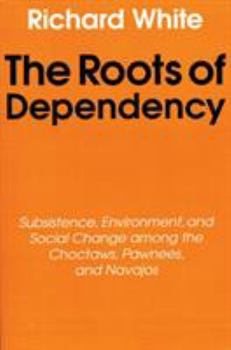The Roots of Dependency: Subsistance, Environment, and Social Change Among the Choctaws, Pawnees, and Navajos
Select Format
Select Condition 
Book Overview
Offers a study of the collapse into 'dependency' of three Native American subsistence economies that represents the best kind of interdisciplinary effort. This description may be from another edition of this product.
Format:Paperback
Language:English
ISBN:0803297246
ISBN13:9780803297241
Release Date:August 1988
Publisher:University of Nebraska Press
Length:433 Pages
Weight:1.30 lbs.
Dimensions:1.1" x 6.0" x 9.1"
Customer Reviews
1 rating
Anthropological and Economic Examination of Depossession
Published by Thriftbooks.com User , 20 years ago
While many works have been published addressing the history of the American Indian nations and their liquidation, it is rare to find this addressed in a rigorous anthropological way. In particular, anthropological analysis of Native American dispossession seems to treat the Indians as a subject and the European Americans as a control group--somehow above anthropological scrutiny. White, therefore, renders a rare service in treating both the Indians and their European American interlocutors as vulnerable actors, subject to misunderstandings, panic, and folly. Another, more important virtue of this book is to explode persistent notions about the economic organization of pre-industrial peoples. White explodes--as did Polanyi, et al--the Hayekian notion of primitive economic man. We learn that "trade" among the profiled Indian nations was not driven by prices and scarcity, but by honor and reciprocal obligation. This misconception has continued to plague Western relations either with pre-modern societies (e.g., in West Africa & the Pacific) but also marginalized communities within industrialized societies (e.g., South Central Los Angeles, or North African diaspora communities in urban France). The familiar, morally satisfying analyses of Western/pre-modern contacts, and their abysmal aftermaths, tend to rely on obvious criminality on the part of the Western actors. This is insidious because it minimizes the implications of an historical narrative for modern social relations (by making it seem like a bizarre anomaly) and because it makes it so much harder to witness and protest modern destructive behavior.




